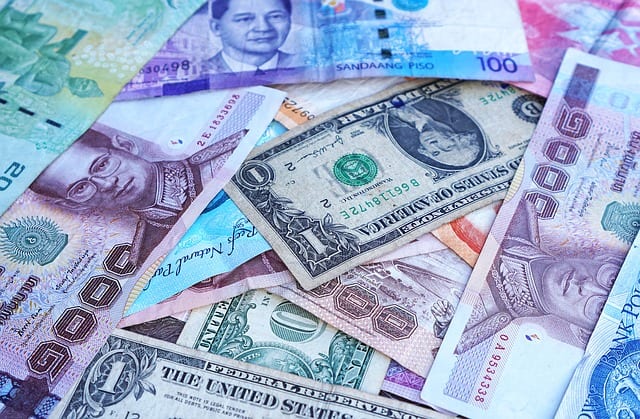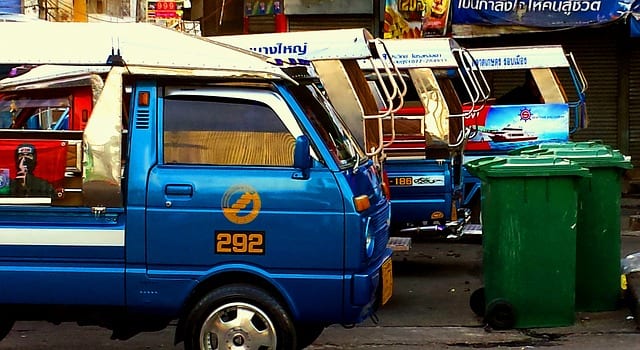
How Much Does It Cost to Live in Thailand? [Updated 2023]
Thailand is often referred to as being cheap for expats. Generally, the cost of living in Thailand is cheaper than in the UK – according to Numbeo, the cost of living is nearly 40% lower in Thailand than in the UK. On average, a family of four will require around £1,600 to spend on monthly costs, in addition to rent, and a single person can live off around £450, not including rent.
The low cost of living, along with the breathtaking scenery and relaxed way of life can all be a huge pull for expats. But, how much does it really cost to live in Thailand?
Thailand Economy
Thailand is a newly industrialised country, and the economy is heavily dependent on exports, which accounts for more than two-thirds of its gross domestic product. In 2011, Thailand became an upper-middle economy and, over the past four decades, has made outstanding progress in its social and economic development. It is the second-largest economy in Southeast Asia, after Indonesia, and is the fourth-richest nation in the region.
The jump from a low-income country to a high-income country has happened in less than a generation. As a result, Thailand has become one of the most championed developmental success stories due to its reduction in poverty and sustained growth.
Thailand is still growing economically but, after such a strong surge, figures are now a little more modest. The worldwide cost of living crisis along with the COVID-19 pandemic have all had an impact on Thailand’s economy. However, it is once again showing year-on-year growth and is forecast to expand by 3.6% this year
The currency used in Thailand is the baht (THB) and it is the tenth most frequently used world currency. One baht equals 100 satang, similar to one British pound equally 100 pence.
Notes come in denominations of 20, 50, 100, 500 and 1,000 baht. The notes are all different sizes and easily distinguishable due to their different colours; green, blue, red, violet and brown. There are also six different coins, including satang and baht. Satang comes in 25, and 50, and Baht come in 1, 2, 5 and 10 value coins. The 1, 5, and 10 satang coins are no longer in circulation and will not be accepted by shops in Thailand.
Tax in Thailand
All residents and non-residents who earn an income from sources in Thailand are liable to pay personal income tax (PIT). Residents will also be liable to pay tax if they live in Thailand and their income is sourced from abroad but remitted in Thailand. You will be considered a resident in Thailand once you have lived there for over 180 days in a tax year.
Thai tax rates will be based on your personal income. The tax rates for 2023 are:
| Net Income (THB) | PIT Rate |
| 0 to 150,000 | 0% (exempt) |
| 150,001 to 300,000 | 5% |
| 300,001 to 500,000 | 10% |
| 500,001 to 750,000 | 15% |
| 750,001 to 1,000,000 | 20% |
| 100,000,001 to 2,000,000 | 25% |
| 2,000,001 to 5,000,000 | 30% |
| Over 5,000,000 | 35% |
Cost of Housing in Thailand for Expats
Buying property in Thailand is a complicated process for expats. Foreigners are not allowed to buy land in Thailand. They can buy apartments or condominium units, however, foreigners cannot own more than 40% of the units in a building. Foreigners can buy an entire apartment building, but they can’t also own the land the building resides on.
Due to the complications and restrictions on owning property and with most landlords being very sympathetic towards expats in terms of lettings, many choose to rent long-term. This is very normal in Thailand and thus the market is varied and the process is very easy.
Renting can often feel extremely informal to foreigners and, for peace of mind, it is worth getting an estate agent to create a rental agreement for both parties to sign. When moving into a new apartment, expats should be aware that they will have to pay all their own utilities, nothing is ever included in the rental price. Energy shortages in Thailand mean that electricity is surprisingly expensive, and new expats should always keep an eye on their bills and save where they can.
According to Numbeo, renting in Thailand is nearly 60% lower than renting in the UK. An apartment in a city centre in Thailand will cost around £302 per month and the same size apartment on the outskirts of the city will cost around £175 per month. A three-bedroom home in the city will cost around £834 per month and the same size property in the suburbs will cost around £480 per month.
Cost of Expat Healthcare in Thailand
Healthcare in Thailand is often good quality, especially in Bangkok and other cities. The majority of doctors and specialist staff speak good English. However, the level of everything deteriorates the more rural you get.
It is the law for all expats to either be covered with the public health insurance scheme, which is only available to workers enrolled in the scheme, or private international healthcare insurance.
Although there are over 1,000 public hospitals in Thailand, equipment is often outdated and waiting times can be hours. For this reason, many expats opt for private healthcare, even if they are eligible for public healthcare. All of the private hospitals in Thailand boast exceptional facilities and all staff have been educated in western universities.
Cost of Education in Thailand
For those expat families where one parent is Thai, and the birth was registered in Thailand, these children are eligible for free public education in Thailand up to the age of thirteen. Expat children who are not considered Thai nationals can still attend public schools, but they will have to pay fees. Public schools will be taught entirely in Thai and to the Thai curriculum.
There are also private and bilingual schools in Thailand. These do not carry the same hefty price tags as international schools and have adopted Western teaching styles over the years. A bilingual school in Thailand can cost around 90,000 baht per year (around £2,000). For families who plan on living in Thailand long term, these schools allow children to interact with other Thai kids and understand Thai culture thoroughly. The English programmes will vary from school to school, and it is best for parents to research extensively before selecting a school for their children.
Most parents, however, prefer to send their children to international schools in Thailand. The cost of Thai international schools can range anywhere between 150,000 baht to 900,000 baht per year (around £3,384 to £20,306). Although they are typically more expensive than bilingual private schools, they provide educational continuity for children by providing a variety of different western curricula. Expat parents should note that popular schools have long waiting lists and admission may be based on language proficiency and academic achievement. Requirements vary from school to school, but it’s always best to start the admissions and enrolment process as early as possible.
Transportation costs are an absolute steal in Thailand. The cheapest way to travel long distance is by bus or minivan. These can often become cramped or unbearably hot, so many foreigners opt to pay a little more for a train ticket. Trains may take a little longer, but they offer greater comfort and cabins for overnight trips.
Many expats use cheap taxis in the cities or make substantial savings with the subway or Skytrain (particularly during rush hour). Expats will find that bus fares go up and down. Do not feel hard done by – this will be based on distance being travelled, and what kind of facilities the bus has.
As well as taxis, motorbikes and tuk-tuks are popular modes of transport and can be a quick option, with very cheap fares based upon distance travelled.
Driving is also an option, although with a relaxed attitude to road laws, this isn’t for the faint-hearted. Buying a car in Thailand can often be just as expensive as buying in the UK. The monthly running costs, including fuel and maintenance, can amount to around 10,000 baht (£225) per month, depending on usage.
Employment Rates in Thailand
Thailand has an unemployment rate of 1.05% which, when compared to the 3.8% of the UK, looks very optimistic. Thailand has generally had a low employment rate in the past few years, and whilst in increased for a few years over the pandemic, as tourism has increased, so has employment.
However, before you can even consider working in Thailand, you must have a work permit. To get a permit, expats must have a non-immigrant visa, which are extremely hard to obtain as you must already have been offered a job.
Understandably, the majority of job opportunities for expats are found in Bangkok, but there are some expats who live and work in the southern islands. Most expats living in Thailand work in the service sector, particularly in the tourism industry. Teaching English is still the most common job role available to expats and offers a salary that is higher compared to local wages. IT, Real Estate, Digital Marketing, and Journalism are all popular industries for expats looking for work in Thailand.
Average Salary in Thailand
The average annual salary in Thailand is 1,160,000 baht, which equals around £26,172. The lowest annual average salary is 288,000 baht (£6,498) and the highest annual average is 5,196,000 baht (£117,235).
Expats working in Thailand should always try and negotiate an expat package in the currency of their home country, or in US dollars. Those moving to Thailand do not move to the country to be financially better-off, but to enjoy the country’s culture as a whole. Foreigners can make a decent living in Thailand, especially in IT, logistics or communication roles. Even if expats earn a lower wage than in their home country, Thailand’s generally lower cost of living can help to balance things out.
Thailand Cost of Living Comparison to UK
The world’s largest database, Numbeo, has a vast selection of user-contributed data in regard to Thailand. Compared to the UK, most groceries, rent, and eating out are all significantly less expensive in Thailand.
The tables below provide an overview of the differences in costs between Thailand and the UK. Please note that all Thai prices have been converted into British pounds.
| Groceries | UK Price (£) | Thai Price (in £) | Cheaper Country |
| Milk (1l) | £1.04 | £1.26 | UK |
| White bread (500g) | £1.06 | £1.05 | Thailand |
| Eggs (12) | £2.21 | £1.37 | Thailand |
| Local Cheese (1kg) | £6.08 | £13.20 | UK |
| Banana (1kg) | £1.08 | £0.91 | Thailand |
| Water (1.5l) | £1.01 | £0.36 | Thailand |
| Transport | UK Price (£) | Thai Price (in £) | Cheaper Country |
| Petrol (1L) | £1.56 | £0.93 | Thailand |
| One-Way Ticket | £2.50 | £0.67 | Thailand |
| Monthly Pass | £66.00 | £26.99 | Thailand |
| Taxi (1km) | £1.24 | £0.88 | Thailand |
| Utilities (Monthly) | UK Price (£) | Thai Price (in £) | Cheaper Country |
| Electricity/Heating/Water for 85m2 Apartment | £204.58 | £53.78 | Thailand |
| Mobile Phone Monthly Plan incl. Calls and 10GB+ Data | £11.61 | £12.01 | UK |
| Internet (60+ Mbps, Unlimited Data, Cable/ADSL) | £30.21 | £13.37 | Thailand |
| Clothing | UK Price (£) | Thai Price (in £) | Cheaper Country |
| Jeans (Levi’s or Similar) | £61.19 | £34.88 | Thailand |
| Dress (Chain Store) | £30.15 | £24.18 | Thailand |
| Nike Running Shoe (Mid-Range) | £66.03 | £67.19 | UK |
| Leather Business Shoes | £66.42 | £56.14 | Thailand |
| Leisure | UK Price (£) | Thai Price (in £) | Cheaper Country |
| Fitness Club Monthly Fee | £31.62 | £35.72 | UK |
| Tennis Court (1 Hour) | £10.80 | £7.21 | Thailand |
| Cinema (1 Ticket) | £10.00 | £4.95 | Thailand |
| Eating Out | UK Price (£) | Thai Price (in £) | Cheaper Country |
| Fast Food Meal | £6.00 | £4.50 | Thailand |
| Meal at Inexpensive Restaurant | £15.00 | £1.80 | Thailand |
| Three-Course Meal for Two People at Mid-Range Restaurant | £60.00 | £19.12 | Thailand |
| Cappuccino | £2.99 | £1.51 | Thailand |
| Coke/Pepsi | £1.51 | £0.49 | Thailand |
| Imported beer | £4.00 | £1.57 | Thailand |
Expatriate Group offers a number of flexible expat health insurance policies designed for living abroad, to help keep you protected overseas. Get a quote for your international health insurance today.


